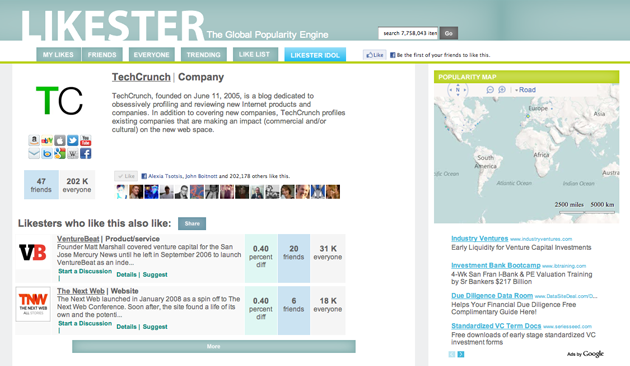With hundreds of thousands of websites integrating with Facebook Likes and 250 million people engaging with Likes just a little after a year after the Like button made its first appearance at F8, the space of Facebook Likes aggregation is about to get competitive. Facebook search engine Booshaka just released their own Facebook Likes categorization yesterday, for example. Likester just overhauled its platform, wanting to become the go-to Facebook Likes aggregator
What Likester does differently from Booshaka is that it shows users realtime and popular Like trends, including what your friends are Liking, what everyone is Liking, what’s trending and a chronological log of all your friends Likes. A maps feature adds locality to what Likes are popular where.
As an example of the potential of this service, Likester is currently trying to predict the winner of American Idol by tracking how many people Like certain contestants during the show.
The best part about Likester is the drill down effects of item affinity when you hit the Details button on a specific Like. You can look into “Likesters who liked this also like” recommendations as well as suggest the content to friends and post it on your Facebook wall. Founder Kevin McCarthy says he is also experimenting with anti affinity, or figuring out what people who Like something dislike.
The site offers the ability to search all Facebook Likes by keyword (to search for all the Seattle-related Likes for example) and by popularity and relevance. You can also search for Like related content on platforms like Amazon, YouTube, Google, Twitter and more.
McCarthy explains the utility of the service,
“I came up with the idea for Likester about a year ago, because Facebook doesn’t show you the whole picture. That is, if just view your news feed every day, you’ll never see the totality of all of your friends likes (some are never shown to you). And you’ll never see likes that occurred more than a day or so apart combined and reported, even when your friends have each individually liked the same thing. Basically, we wanted to provide a structured format for a user to manage all this data. An average user of ours, in their friend network, has 15,000 likes. How can you possibly make sense of all of that data, without a service like this?”
Likester is currently bootstrapped and run by a small team of five out of Seattle, Washington. McCarthy is currently talking to customers like ChannelAdvisor to up the ante on retail adoption of Like data as a marketing tool.
